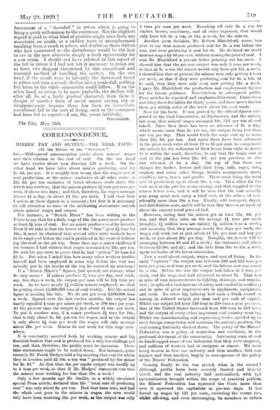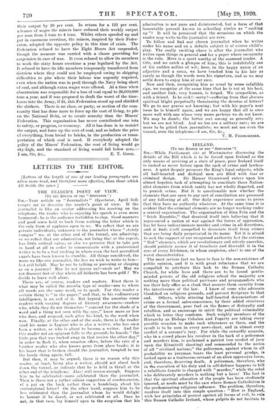CORRESPONDENCE.
MINERS' PAY AND OUTPUT.-THE REAL FACTS.
(TO THE EDITOR OP THE " SPECTATOR."]
Ste,-Widespread misconception exists about miners' wages and their relation to the cost of coal. On the one hand we have stories about men drawing £20 a week. On the other hand we have tales about miners producing coal for 2s. 6d. per ton. It is roughly true to say that the wages cost of coal production, at the mines-exclusive of all other costs-is 22s. 6d. per ton exclusive of latest advance, made since this article was written; that the miners produce 41 tons per man per week of about five days ; and that, therefore, the wages average almost £1 a day, or about £4 15s. per week. I will show how I arrive at these figures in a moment ; but first it is necessary to call attention to some of the misleading statements current about miners' wages and output.
For instance, a " Scotch Miner " has been writing to the Times to say that for a daily wage of 16s. the miner must produce at least 2i tons of coal. But no miner produces coal by himself. Even if we take it that the hewer at the " face " gets 4 tons for 16s., it must be observed that several other mine workers have to be employed before the coal is produced in the sense of deliver- ing the stuff at the pit top. Some time ago a miner challenged me because I had written that wages amounted to 20s. per ton. He sent his pay-note to prove that he had "gotten" 25 tons for £5 5s. But when I asked him how many other workers besides himself had been employed in some way before the coal was actually put in the trucks at the top he counted up nineteen !
If a " Scotch Miner's " figures, just quoted, are correct, what do they mean ? If miners produce 2k tons per day, and work, say, five days a week, the output per man will bo 12 tons per week. As we have nearly million miners employed, we shall be getting about 15,000,000 tons of coal weekly. But the actual figure is nothing like this. We do not get even 5,000,000 tons a week. Spread over the last twelve months, the output has barely equalled 4 tons per miner per week, or 200 tons per year. At the present time the output is just about 41 tons per week. To put it another way, if a miner produces 4 tons for 16s., that is only about 6s. 6d. per ton for wages, and as the output is only about 41 tons per week the wages will only average about 28s. per week. Miners do not work for this wage now- adays.
It is constantly asserted both by working miners and big Socialist leaders that coal is produced for a very few shillings per ton, and that, therefore, the profits must bo enormous. These false statements ought to be nailed down. For instance, quite recently Mr. Frank Hodges told a big meeting that coal for which they in London paid £2 10s. a ton was " produced by the miner for 2s. 6d." At that time the per capita output was hardy up to 4 tons per week, so that if Mr. Hodges' statement was true the miners were working for less than 10s. a week !
Only a few months ago Mr. Smillie, in a widely circulated 'pedal Press article, declared that the " total cost of producing coal " was only about 9s. per ton. Had that been true, and had the whole cost gone to the miners in wages, the men would only have been receiving 36s. per week, as the output was only
4 tons per man per week. Knocking off only 3a. a ton for timber, horses, machinery, and all other expenses, that would only have left 6s. a ton, or 24s. a week, for the miners.
Another great Socialist, Mr. Robert Blatchford, wrote last year to say that miners produced coal for 3s. a ton before the war, and were producing it now for 6s. He declared we could increase wages by 50 per 'Dent. without raising the price of coal. I sent Mr. Blatchford a private letter pointing out his error. I showed him that the pre-war output was only 5 tons per week. so that at 3s. a ton the miners would only have got 15s. a week. I showed him that at present the miners were only getting 4 tons per week, so that if they were producing coal for 6s. a ton, as he said, then they were only even now getting 24s. a week. I gave Mr. Blatchford the production and employment figures for his future guidance. Nevertheless, in subsequent public Press articles ho repeated and emphasized hiis error. I have been watching these Socialists for thirty years, and have never known them get within miles of the truth about the coal trade.
Now for the facts. It was proved by the official figures sub- mitted to the Coal Commission, to Parliament, and the nation, last year, that miners' wages averaged 198. 4d. per ton of coal raised. Since then there has been an advance of 2s. a day, which means more than 2s. per ton, the output being less than one ton per day. That would fetch the wage cost up to more than 21s. 6d. per ton. And again there have been advances in the piece-work rates of from 12 to 15 per cent. to compensate the miners for the reduction of their hours from eight to seven. It is within the mark, therefore, to say that the wages cost of coal at the pits has been 22s. 6d. per ton previous to this last advance of 2s. a day. On top of this there are charges for timber, horses and their keep, rails, ropes, tubs, engines, and many other things, besides management, rents, royalties, rates, taxes, and profits. These must bring the total cost of production up to about 30s. a ton. Then allow for the coal used at the pits for steam-raising, and that supplied to the miners below cost, and it will be seen that the coal actually sent away must now carry a total cost, at the mines, of con- siderably more than 30s. a ton. Finally, add transport, depot, and distribution costs, and it will be seen that there is no mystery about the current retail price of fuel.
However, seeing that the miners get at least 22s. 6d. lx r ton, and that they raise on the average 4+ tons per week (roughly, 1+ million men are raising 4} million tons a week), and assuming that they average nearly five days per week, the wages will work out at just about £4 15s. per man and boy per week, or just about 20s. per day. Roughly, the hewers will be averaging between £6 and £7 a week ; the trammers and others between £3 10s. and £4 ; and the lads from 30s. to 45s. a week, again exclusive of the latest concession.
Now a word about output, wages, and cost of living. In the early " eighties " the output was between 310 and 312 tons pc r man per year, or 6 tons per week, and the labour cost was about 5s. a ton. Before the war the output had fallen to 5 tons per week, and the wage cost had advanced to about 7s. That was in spite of vast improvements in lighting, drainage, and ventila- tion ; in spite of a. vast increase of safety and comfort in working ; and in spite of great improvements in appliances, equipment, and tools. No other big industry had such a black record as mining in reduced output per man and per unit of capital. Whilst our output fell from 310 tons to 250 tons a year per mama, that of the United States increased from 400 tons to 680 toes, and the output of every other important coal country went up. Whilst our manufacturing and engineering trades speeded up to meet foreign competition and maintain the nation's position, the coal-mining fraternity slacked down. The policy of the Miners' Federation was a policy of restriction and costliness, to the profound detriment of the community. Increasing costs of coal so handicapped some of our industries that they were stagnant, and millions of workers had to emigrate or starve. We were being beaten in first one industry and then another, first one market and then another, largely in consequence of the policy of the Miners' Federation.
Coming finally to the war period, what is the record Although profits have been severely limited and heavily taxed, and the coal industry half nationalized, with full nationalization brought within the scope of practical politics, the Miners' Federation has squeezed the State more than ever it squeezed the capitalists in pm-war days. It has forced up wages by 121 per cent, excluding the recent rise, whilst allowing, and even encouraging, its members to reduce their output by 20 per cent. In return for a 121 per cent. advance of wages the miners have reduced their weekly output per man from 5 tons to 4 tons. Whilst others speeded up and put in enormous overtime, the miners, inspired by their Feder- ation, adopted the opposite policy in this time of crisis. The Federation refused to have the Eight Hours Act suspended, though the measure was carried with a clause providing for suspension in case of war. It even refused to allow its members to work the sixty hours overtime a year legalized by the Act. It refused to have its idle members temporarily transferred from districts where they could not be employed owing to shipping difficulties to pits where their labour was urgently required, even when the nation was in peril through the Navy being short of coal, and although extra wages were offered. At a time when absenteeism was responsible for a loss of coal equal to 26,000,000 tons a year, and it was proposed to draft the worst of the time- losers into the Army, if fit, this Federation stood up and shielded the shirkers. There is no class, or party, or section of the com- munity that has done more to force up the cost of living, to pile en the National Debt, or to create scarcity than the Miners' Federation. This organization has never contributed one iota to safety, or progress, or economy. All it has done is to restrict the output, and force up the cost of coal, and so inflate the price cf everything, from bread to bricks, in the production or tram- Foliation of which coal is used. If everybody adopted the policy of the Miners' Federation, the cost of living would go sky-high, and the standard of living would fall below zero.—.







































 Previous page
Previous page